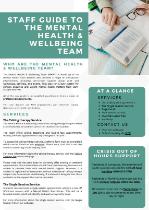Starting the Conversation
Approaching a student about their wellbeing can feel daunting, but showing care and concern can make a significant difference. Here are some tips:
- Choose a private, quiet space to talk
- Be calm, non-judgmental, and empathetic
- Use open-ended questions like “How have you been feeling lately?”
- Reflect back what you hear to show understanding
Remember, you don’t need to have all the answers—just being there matters.
Knowing Your Role and Boundaries
As a staff member, your role is to:
- Listen and offer initial support
- Signpost to appropriate services
- Maintain confidentiality within safeguarding limits
- Seek advice if you're unsure
Avoid offering counselling unless you are trained to do so. Instead, refer students to professional services.
Referral Pathways and Support Services
Encourage students to access:
- University Mental Health and Wellbeing Services – Free, confidential support for all students. Use the Student Enquiry Point to access this support.
- External Resources – Such as Mind, NHS 111, or local mental health charities.
In urgent situations (e.g., risk of harm), call the emergency services on 999.
Training and Resources for Staff
We encourage all staff to:
- Complete any appropriate training.
- Familiarise yourself with our Student of Concern referral process using the Student Enquiry Point.
- Debrief with colleagues or line managers after difficult conversations.
- Access our Employee Assistance Programme for your own wellbeing.
External Support: Mind
Mind offers a wealth of resources tailored to students, including:
- Tips for managing stress and anxiety
- Guidance on accessing university and external support
- Information on rights and reasonable adjustments
- Peer support and helpline
Visit Mind’s Student Mental Health Hub for more.


